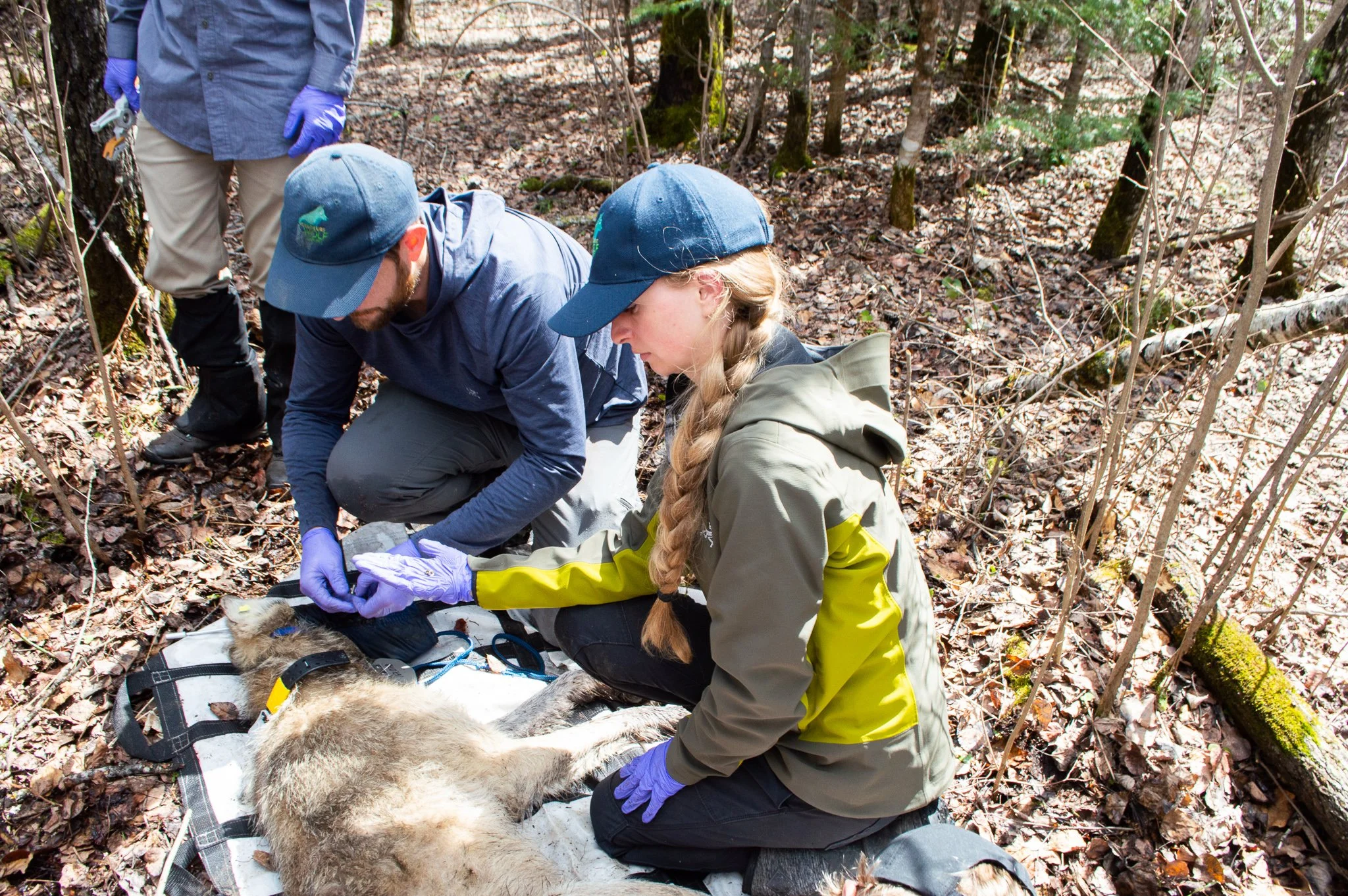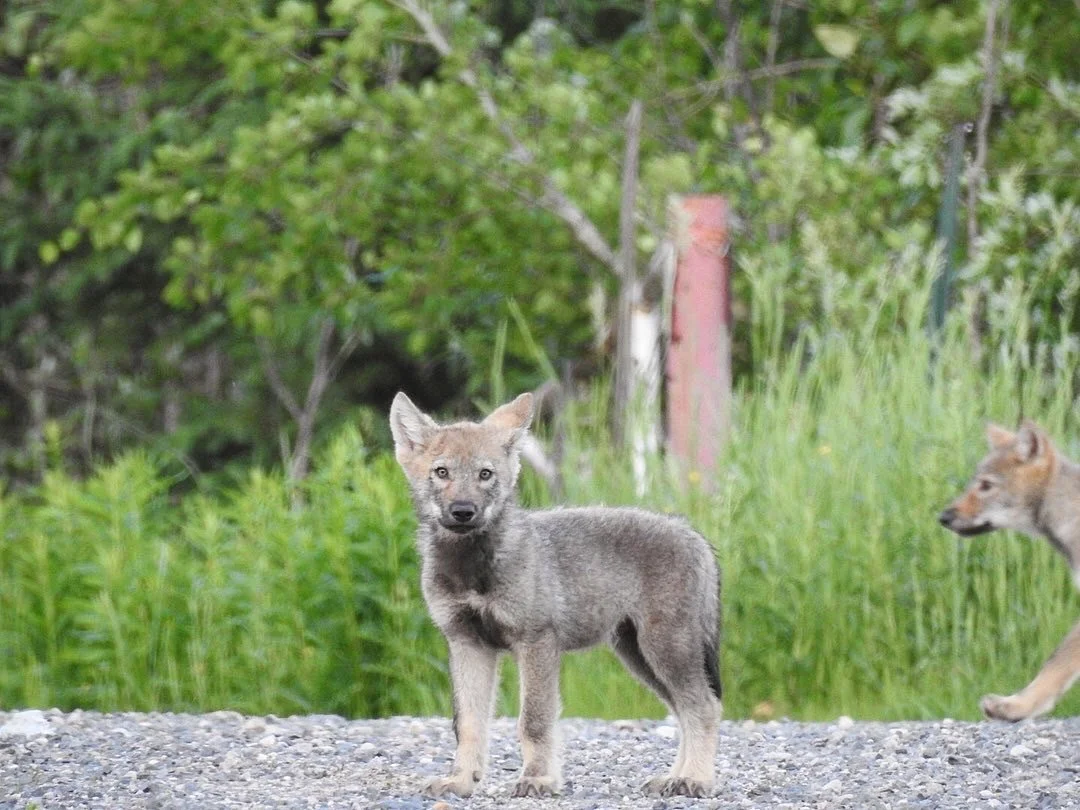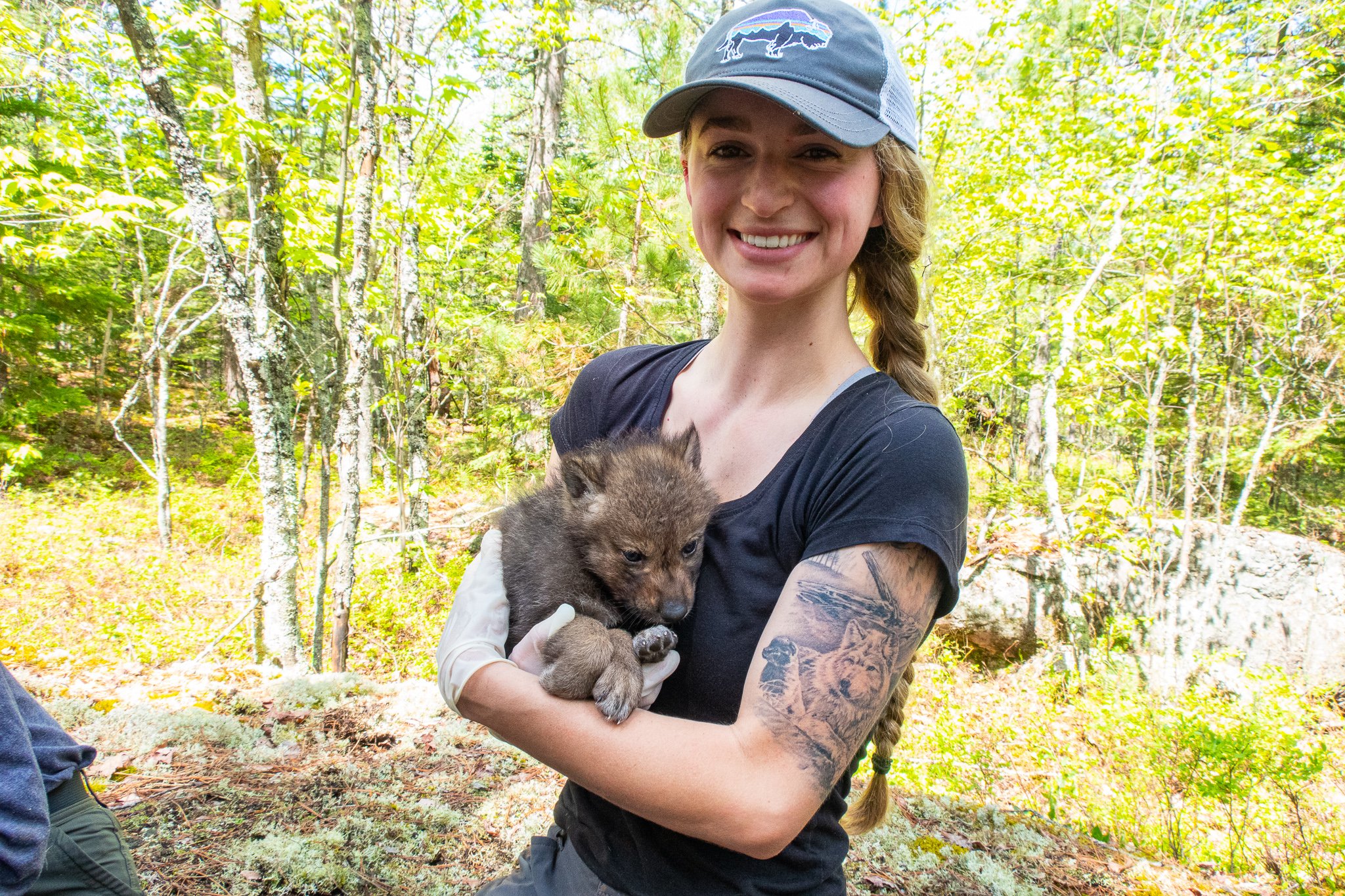Meet Maeve Tuley: Wolf Ecology Field Fellow
For as long as Maeve Tuley can remember, her life has revolved around wolves. She developed a fascination for this elusive wildlife at a young age. Growing up in northern Illinois, Maeve did not live in wolf territory, yet her curiosity of them skyrocketed. This passion led her to pursue a degree in Wildlife Biology from Montana State University in Bozeman and volunteer with the Yellowstone Wolf Project. Maeve monitored wolves in the rugged backdrop of the Rocky Mountains. Yet, it would be the northern hardwood forests of the Greater Voyageurs Ecosystem, and its elusive wolves, that truly ignited Maeve’s passion.
Maeve is spending her summer as a Field Fellow with the Voyageurs Conservancy. The Voyageurs Field Fellow program offers paid internships for students and recent graduates to gain hands-on professional experience in Minnesota’s national park. Maeve is completing her fellowship as a Wolf Predation & Research Technician under the Voyageurs Wolf Project - a research project in the Greater Voyageurs Ecosystem that studies the summer predation and reproductive behavior of wolves.
Maeve’s fieldwork involves hiking through the thick northwoods forest to track the behavior and ecology of wolves. Research begins with collaring wolves early in the season to track their location. These collars put out a signal if a wolf has been in the same location for 40 minutes. Two or more signals create a “cluster.” A cluster signifies a location where a wolf has spent an extended period of time in. From there, Maeve hikes to these clusters to investigate and identify what the wolves were doing at this site. These sites may reveal killed prey, beaver hunting attempts, bed or rendezvous sites, and even pups! Maeve and the Voyageurs Wolf Project team collect a large amount of data from the fourteen packs they are monitoring throughout the summer.
Maeve describes these wolves as “ghosts in the forests” with fascinating behaviors including hunting beavers and sustaining themselves on blueberries in the summer. Spending sometimes 10 - 12 hours a day in the field, Maeve has experienced many “once-in-a-lifetime” encounters with wildlife.
On a windy day on the Kab-Ash Trail in Voyageurs National Park, Maeve heard shuffling noises that she initially dismissed as a deer. Upon looking up, she saw a wolf on a hill next to her and instinctively crouched down. A pack of five curious pups started barreling towards Maeve. She quickly yelled “Hey!” and waved her arms to deter these young wolves from getting any closer. She was likely the first human these pups had encountered. Her research came full circle when she would eventually collar and study two of these wolves the next year.
Though breathtaking in nature, fieldwork is not always glamorous in the Greater Voyageurs Ecosystem. Maeve battles difficult terrain, thick vegetation, and often “apocalyptic” bugs to get to these cluster sites. However, these challenges are worthwhile to Maeve who is driven to contribute to this groundbreaking scientific research. She attributes her capability to continue this fieldwork to the support of the Voyageurs Field Fellows program.
“With the fellowship, supporting me with a stipend, housing, gas, and other supplies to do this extensive fieldwork - it has been extremely helpful. If I didn’t have funding, I don’t believe I could return and continue this work so the fellowship has been very helpful for me in the long-term to continue this dream,” says Maeve.
As a Voyageurs Field Fellow, Maeve has received enriching professional development opportunities. Through the fellowship, Maeve will present her research at the International Wolf Symposium - a goal of hers from a young age. She is also grateful to build relationships with other young professionals in the Field Fellowship program and grow her connections in the public lands sphere.
Maeve’s field work has been instrumental in achieving her long-term goals. She will be pursuing her Master’s degree at Northern Michigan University in Marquette, Michigan this winter where she will focus her thesis on wolf ecology. Maeve hopes her research not only contributes to the scientific community, but helps improve the public’s perspective and understanding of these complex creatures.
“I hope to teach people about wolves and hopefully find a better coexistence somehow in the future just by teaching and education through the research we’re doing. Even if people don’t end up loving wolves, I hope they will develop a better appreciation for them and the land here, because it is so special and wild.”
Support Field Fellows:
The Conservancy’s Voyageurs Field Fellows program seeks to increase accessibility and professional development opportunities at Voyageurs National Park. The fellowship offers students and recent graduates a stipend-paid internship to engage in real world, hands-on work in areas such as preservation, natural resource management, environmental education and more. If you’d like to support future Field Fellows and their important work, please consider becoming a member with a gift today.
Funding for this project was provided in part by the Minnesota Environment and Natural Resources Trust Fund as recommended by the Legislative-Citizen Commission on Minnesota Resources (LCCMR).
The Trust Fund is a permanent fund constitutionally established by the citizens of Minnesota to assist in the protection, conservation, preservation, and enhancement of the state’s air, water, land, fish, wildlife, and other natural resources.






